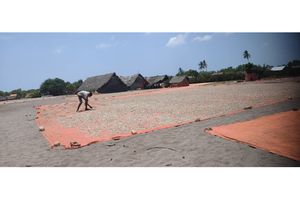Prime
Tanzania intercepts 14 tonnes of chemicals linked to illicit drug production

DCEA Commissioner General Aretas Lyimo
What you need to know:
- DCEA Commissioner General Aretas Lyimo said on April 24 that the country has witnessed several attempts to import precursor chemicals used in manufacturing industrial narcotics, whose availability has diminished locally.
Elizabeth Edward
Dar es Salaam. The Drug Control and Enforcement Authority (DCEA), in collaboration with the International Narcotics Control Board (INCB), has intercepted 14 tonnes of industrial chemicals allegedly intended for the production of illicit drugs.
The seized chemicals—4,000 kilogrammes of 1-Boc-4-piperidone and 10,000 kilogrammes of acetic anhydride—were imported from Asia without documents detailing their intended use. Officials say the chemicals were bound for Igunga District in Tabora Region, where suspects allegedly planned to establish an illegal drug production lab.
DCEA Commissioner General Aretas Lyimo said on April 24 that the country has witnessed several attempts to import precursor chemicals used in manufacturing industrial narcotics, whose availability has diminished locally.
“If the chemicals had entered circulation, they could have been used to produce large quantities of heroin and fentanyl,” said Mr Lyimo. “The 10,000 kilogrammes of acetic anhydride could yield up to 3,704 kilogrammes of heroin, while the 1-Boc-4-piperidone could produce 8,000 kilogrammes of fentanyl.”
He noted that even small amounts of fentanyl are lethal. “One kilogramme of fentanyl can cause up to 500,000 deaths. Two milligrammes can be fatal depending on a person’s weight, health, and drug history. This means the seized quantity had the potential to cause up to four billion deaths.”
Mr Lyimo said investigations are ongoing, with international collaboration, to dismantle networks behind the smuggling and diversion of precursor chemicals.
In a related incident, DCEA arrested Ugandan national Herbert Kawalya in possession of 10 packs of sweets weighing 174.77 grammes, infused with cannabis and containing a high concentration of tetrahydrocannabinol (THC).
Kawalya, who owns Hoxx Wells Lux Tour Limo, was arrested alongside a Mercedes Benz with South African registration MG 33 BM GP. The vehicle was allegedly transporting the sweets from South Africa into Tanzania.
“When questioned, he claimed it was his first attempt at smuggling the sweets for sale in hotels. We are still investigating to assess the scale of the operation,” said Mr Lyimo.
He said the THC content in the sweets was 92 percent, the highest level ever recorded by the authority. “By comparison, skunk cannabis contains between 40 and 60 percent THC, and ordinary cannabis contains between 10 and 13 percent.”
According to Mr Lyimo, the manufacture and smuggling of such products represent a deliberate effort by criminals to harm the country’s youth.
Mr Lyimo said continued importation, transport, and cultivation of illicit drugs suggest corruption among those tasked with enforcement.
“We have been conducting operations, but we continue to find cannabis farms, precursor chemicals, and synthetic drugs. This implies there are officials who are not fulfilling their responsibilities.”
He said DCEA has agreed with the Prevention and Combating of Corruption Bureau (PCCB) to investigate public officials, including village and ward leaders, in areas where drug activities are reported.
PCCB Deputy Director of Investigations Thobias Ndaro warned public servants who collaborate with drug dealers.
“Drug traffickers use substantial funds to secure their operations. If a public servant is involved, they will be held accountable. Our collaboration with DCEA will ensure that no one involved in these activities goes unpunished,” he said.




